New Wave Ripples: Exploring the Bold Terrain of Contemporary Romanian Cinema
Do Not Expect Too Much from the End of the World (2023)
Regularly branded the or a Romanian New Wave, a significant semi-cohort of regularly-working film directors began to stake a claim for themselves on the international film festival circuit in the aftermath of Cristian Mungiu’s 4 Months, 3 Weeks and 2 Days and its triumph at Cannes in 2007. Mungiu’s extraordinary picture, recently programmed by Calgary Cinematheque as part of our Adversity and Resilience Series, would in many ways establish a perfunctory template for exciting Romanian movies shortly to surface globally, such as those, most notably, of Corneliu Porumboiu and Cristi Puiu. Like Mungiu, Porumboiu and Puiu tend to tell stories naturalistically in real locations, and though they will all experiment and innovate in their individuals ways, their individual films tend to adhere formally to their own presiding aesthetic interests and the basic self-unity of same. Radu Jude is a much thornier subject, and not just because his films increasingly push irony, accentuated human crudity, and anarchic bewilderment to extremes nobody else in Romanian cinema is even seeking. Jude makes both documentaries and feature narrative films; he has always to one extent or another seen methods inherent to the separate fields as interchangeable or of crossover utility. In discussing his bold and wilfully experimental new feature Do Not Expect Too Much from the End of the World (2023), the director is quick to note that in order to best appreciate all the virtuosic multimedia mayhem and its contexts, the audience should probably also be informed that aside from making features and documentaries, Jude has also directed adds and worked as a production assistant in television (in whatever circle of hell they make you do that).
Do Not Expect Too Much from the End of the World (2023)
Jude’s international stock has risen demonstrably with the two narrative features directly preceding his latest, 2018’s I Do Not Care If We Go Down in History as Barbarians and 2021’s Bad Luck Banging or Looney Porn, films in which stylistic experimentation and variation become increasingly conjoined to representations of institutional rot and rapturous discord within the public commons, as in some of the more recent films of Ukrainian director Sergei Loznitsa, himself a dabbler in both documentary and narrative fiction, though he remains by some measure the less confrontational and brazen of the two artists.
Whereas Bad Luck Banging was broken into three distinct sections which employed individually unique storytelling and filmmaking methods, Do Not Expect Too Much from the End of the World is broken into only two sections. The first and by far the longest section follows Angela (Ilinca Manolache)—production assistant on a work safety movie commissioned by an Austrian corporation and part-time Andrew Tate-style online provocateur—as she races around Bucharest on endless soul-destroying errands with no sign of reprieve, a victim of labour precarity, impossibly bad administrative organization on a global scale, and compromised personal instincts. The final and far shorter section, shot from a single stationary camera set-up, could not be more distinct from the whirligig urban mayhem that has preceded it, but in depicting how one helpless labourer is browbeaten by functionary after functionary into changing his official version of an onsite work accident, the film is underscoring how all our rabid hustle and bustle only manages to serve a status quo from which next to nobody would appear to perceptibly benefit. You can tell how angry people are from all the yelling and cursing!
Do Not Expect Too Much from the End of the World (2023)
Part of the intertextual fun of the first section of Do Not Expect Too Much from the End of the World involves the strategic intercutting of highly complimentary footage from the 1981 film Angela Moves On, also a movie largely about driving around Bucharest. Reverse Shot critic Lawrence Garcia argues I think for sure correctly that this whole conceit is done in homage to Dusan Makavejev’s 1968 film Innocence Unprotected. It’s a pointed comparison, as both Makavejev and Jude are directors of the former Soviet Bloc hellbent on never paying credence to the supposed pieties of their time and place. There is also increasingly in Jude the persistent refraction of the recently-parted Jean-Luc Godard, some trick of photochemical magic having reiterated some of the master’s core ideas regarding media and method with a grim and smirking indiscretion. Because Bad Luck Banging and Do Not Expect Too Much from the End of the World are such funny movies, it may seem unusual to insist that the Godard films to which Jude would appear to owe the greatest debt, especially at the level of what is most radical in his own work, are those made in the late 60s and early 70s in collaboration with Jean-Pierre Gorin and the Dziga Vertov Group. These were defiantly radical and non-commercial films and most people who have seen them would not attribute to them any discernible sense of humour. However, when it comes to something like the brief documentary vignette on how to make a bomb near the end of 1970’s Le vent d’est, it would appear to be the case that there are certain viewers who, far from wondering aghast at the legality of such sordid pedagogy, merely have themselves a bit of a laugh and proceed to meditate upon how they themselves might artfully appropriate some version of that darling bomb bit.
Written by Jason Wierzba



